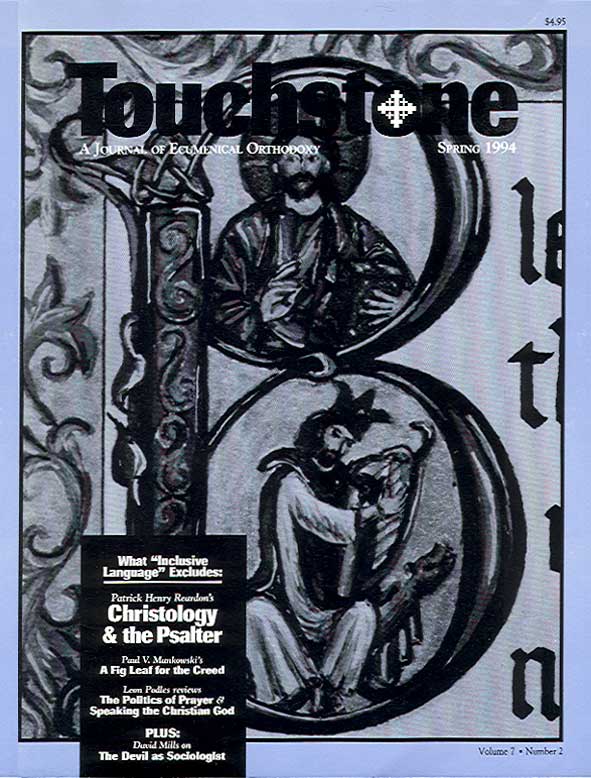Avoiding Spirituality
A Philistine Looks (Obliquely) at Spirituality
by S. M. Hutchens
I confess to being flummoxed by much of what I see under the publisher’s rubric “spirituality.” Some of this, no doubt, comes from philistinism traceable to personal faults—but not all, since the term appears to cover not only firm ground but also a great deal of swamp. In short, I know what fasting is; I know what prayer is; I know what meditation is; I am still not sure I know what spirituality is, although I think I have a reasonable idea of what it shouldn’t be. Having read somewhat more Ambrose Bierce (that great Protestant theologian) than is good for me, I disgorge the following Devil’s Dictionary citation:
Spirituality. (1) the affectation whereby certain kinds of turbulent personalities inflict their neuroses upon the rest of us by flaunting them as religious qualities to be emulated; (2) the Will to Power exercised through the manipulation of religious sensibility.
The misanthrope becomes a Christian and discovers he was really an eremite all along; the anti-social discovers the wonders of apocalyptic prophecy; the anorectic finds herself a model of ascetic devotion; the compulsive finds that there is more to be gained all around by mumbling prayers from dawn to dusk than from stacking and unstacking little piles of paper clips. The greatest of these wraps himself in chains and a hair shirt and stands on a pillar gazing at the sun, thinking that by so doing he honors the will of the One who went about doing good.
I am not a cynic. I believe in great contemplatives, great ascetics, great men of prayer, and that spiritual growth involves pain. But I also believe that in thinking on these matters we are not relieved of our obligation to discern the spirits to see if they come from God. The great saints (which we are all called to be) are not the despisers of the flesh, the morbidly punctilious, the superstitious, the nervous, or the angry. They are worthy of emulation not because they fasted or studied or prayed—the Gentiles do the same—but because they do the will of God. Let us not forget that the heaviest charges against our Lord were leveled by the rigorists. If they were using today’s terminology, they would have said that he was insufficiently spiritual.
Our Lord Jesus, who did the will of the Father in all things, fasted heroically, prayed without ceasing, and his thoughts were the very thoughts of God. Those who would be complete Christians must do what he did. But the essence of “spirituality” in such matters involves doing them but in due time and measure, and always under the Spirit’s guidance. All spiritual disciplines are comprehended in obedience. It is dreadfully easy to fall into the trap of thinking things like, “The more difficult I find some discipline, the more necessary it is to afflict myself with it as often as possible,” for while frequent affliction may indeed be what will relieve and sanctify us, it may also make us worse than we already are. We cannot be our own spiritual physicians, and general rules about spiritual discipline give us no information whatever about what we are actually to do. We may find ourselves committing some folly by following good (so to speak) principles apart from the will of God. The Scriptures tell us about the times Jesus fasted and prayed all night, but these were done in the context of a life in which he customarily ate normal meals and got the proper amount of rest, also in accordance with the will of the Father. When the Spirit drove him out to the wilderness to be tempted he did not stay there to gain extra merit for extra misery. When the ordeal was over, the Devil left for a while and angels ministered to him.
There are two kinds of people who find the Christian spiritual disciplines difficult—and I think we all contain both of them within us, usually with one or the other predominating. The lazy do, of course. But so do the naturally energetic, those whom it is easy to regard as athletes of devotion because they are always doing something unappealing in God’s name. It does not appear to me that God is a respecter of persons in his distribution of proclivities: the naturally active has no advantage over the naturally lethargic. (Read Karl Barth’s magnificent treatise on the sin of sloth!1) The truly disciplined person is the truly obedient person who allows the rod and staff of the Good Shepherd to do their work in his life, prodding him on if that is what he needs, or holding him back. This is not to be confused with the integer vitae, the measured life of the disciplined pagan. It is rather the life of the Son of God lived in and through us. We find this hard because we are fallen creatures, but the hardness is rarely so much in the doing as in the obedience that brings us to it. Some find it easier to climb the mountain than to rest; others to rest than climb. Whatever the natural tendency, the great thing is to do what one should.
There is another reason why I prefer thinking in terms of obedience rather than invoking the category “spirituality.” Talk about spirituality seems almost invariably to remove the regular exercises of the Christian life one or more levels from what is expected of ordinary Christians—a very bad thing. If the least impressive believer is on his way to becoming a god, the plain Christian life is that of the giant, the hero, the saint, and the martyr. These are not things that extraordinary Christians become, but that ordinary Christians are when they follow Jesus. We look for the spectacular in our saints, and tend to admire it far too much. The greatest of our Lord’s own spiritual accomplishments—his highest exercise of spiritual power—was on a day he simply allowed himself to be led away and killed. Jesus, in fact, doesn’t really look to me like a Catholic, Protestant, or Orthodox saint.2 There is too much plain manliness, too much blunt practicality in kingdom matters (this is where Mother Teresa looks most like her Lord), too much healthy flesh and blood. He doesn’t make enough of the miracles, and they are too burdened with teaching—which seems to be their main point anyway. Once again, he isn’t spiritual enough.
If I understand St. Paul rightly, the thirteenth chapter of First Corinthians is the great New Testament commentary on this subject, its message being that spirituality without charity, like faith without works, is dead. Everything we have been discussing here falls under the categories employed in the first three verses: speaking in the tongues of men and angels—ecstatic experience and prayer—the exercise of prophetic powers, and even, most remarkably, accomplishment of great acts of good will, including self-giving to the point of immolation. The teaching that these things are vain apart from charity is built on the Apostle’s understanding of the paradox and irony of human existence under the law of God. The giving of the self—which is the essential and necessary act of the spiritual man’s life—is only the giving of a thing which shall vanish into nothingness anyway apart from the unmerited favor of God.
What, indeed, does it matter if one gives one’s body to be burned if that body is dust and ashes to begin with? This is not in itself a meritorious act, merely a realistic response to the way things are. That the life of one depends upon the death of another is simply a law of nature with which we must comply, either willingly or not. In giving our bodies to be burned we might very naturally credit ourselves with immense goodness, but in fact any goodness that is in it is, from the standpoint of the Christian and Jew—the hardest-nosed moralists in the world—quite extraneous not only to the act itself, but even to all the good intentions that accompany it—donum superadditum, for all good things, even good intentions, come from God. The Jew knows that the greatest acts of human good are vanity apart from the covenant mercies of God, and the Christian adds to this the knowledge that apart from the power of the new creation in the resurrection of Jesus Christ, that is, apart from the great Act of divine charity toward us, in which all other acts of charity must inhere to be charitable, all putative good comes to nothing.
I the Preacher have been king over Israel in Jerusalem. And I applied my mind to see and to search out by wisdom all that is done under heaven; it is an unhappy business that God has given the sons of men to be busy with. I have seen everything that is done under the sun, and behold, all is vanity and a striving after the wind. . . . The sum of the matter is this: Fear God and keep his commandments, for this is the whole duty of man. (Eccles. 1:12; 12:13)
Thou turnest man back to the dust, and sayest, Turn back, O children of men! . . . Thou dost sweep them away; they are like a dream, like grass which is renewed in the morning: in the morning it flourishes and is renewed; in the evening it fades and withers. . . . Let the favor of the Lord our God be upon us, and establish thou the work of our hands upon us, yea the work of our hands establish thou it. (Ps. 90:3, 5, 17)
If I give away all I have, and if I deliver my body to be burned, but haven’t charity, I gain nothing. (1 Cor. 13:3)
These are powerful antidotes to foolishness about spirituality, or about anything else, for that matter. They force us to look far beyond the mere possession of spiritual gifts, beyond even the possible meritoriousness of their exercise, to inquire after the favor of God upon what we do—for charity, which is God’s gift to us before it is our gift to anyone else, is that in which, and by which only, the work of our hands is established.
The law of God has not changed. If someone would disparage Qoheleth as a primitive legalist for saying that the whole duty of man is to fear God and keep his commandments (something that Protestants in particular seem to have a hard time with), I would point him toward the one who said that if we love him we will keep his commandments, and who, after forgiving the woman taken in adultery, told her to go and behave herself, presumably according to the dictates of the law; who, after healing the leper, told him to show himself to a priest of the Mosaic dispensation. The Christian may be gifted with a more complete understanding of precisely why he is to be obedient, but the injunction and its ethical result is the same. Obedience to the commands of the Lord is, once again, the first and final act of Christian spirituality.
All of us have a lopsided spirituality in accordance with our natural strengths and weaknesses. All have the tendency to modestly congratulate ourselves on what we regard as our strong points, either ignore or brood on our weak ones, and reproach others for succumbing to sins that don’t tempt us much. All this is to be put aside for doing what is required of us, and growing toward other and greater acts of submission.
How does one become “spiritual”? Better to ask how one becomes obedient, for when it is put that way the answer always is closer to hand. I know it is in my own life, where God’s directions on what I am to do and to avoid—although rarely the actual outcome of the doing or the avoiding—are quite clear. If I followed them as I know I ought, there is little doubt that I would become more pleasing to God than I am, and the question of whether I was more spiritual as a result would solve itself. It is plain, for example, that my central calling is to teach, and secondarily, perhaps, to preach (opinions have differed on the latter). At any rate, I have found it necessary, for the life of the mind in the body, for a strict fast before doing either. These labors also must be supported by study and meditation, which I cannot do well on a full stomach. If I am to do what I ought and do it well, I must, for the joy of becoming more of what God already has made me, correct many poor habits, eating and otherwise. My call, if pursued with proper diligence, will lead to other virtues, not artificially appended to the life I have been given as random self-improvement programs, but as increasingly necessary parts of the whole. One test must be passed, one more ray of light absorbed, before I move on to the next. So I will become more obedient—more spiritual if you insist—as I do from hour to hour what I know quite well the Spirit requires of me. I shall die uncompleted, but perfection ( teleosis) is not required of mortal flesh. Faithfulness is.
Notes:
1. Church Dogmatics IV/2: 403ff.
2. More philistinism perhaps, but Orthodox saints are too flat, Catholic saints too pale, and Protestant saints too anti-catholic.
S. M. Hutchens is a senior editor and longtime writer for Touchstone.
subscription options
Order
Print/Online Subscription

Get six issues (one year) of Touchstone PLUS full online access including pdf downloads for only $39.95. That's only $3.34 per month!
Order
Online Only
Subscription

Get a one-year full-access subscription to the Touchstone online archives for only $19.95. That's only $1.66 per month!
bulk subscriptions
Order Touchstone subscriptions in bulk and save $10 per sub! Each subscription includes 6 issues of Touchstone plus full online access to touchstonemag.com—including archives, videos, and pdf downloads of recent issues for only $29.95 each! Great for churches or study groups.
Transactions will be processed on a secure server.
more from the online archives
calling all readers
Please Donate
"There are magazines worth reading but few worth saving . . . Touchstone is just such a magazine."
—Alice von Hildebrand
"Here we do not concede one square millimeter of territory to falsehood, folly, contemporary sentimentality, or fashion. We speak the truth, and let God be our judge. . . . Touchstone is the one committedly Christian conservative journal."
—Anthony Esolen, Touchstone senior editor









